The Daily Diary of a Wandering Restaurateur
Derbyshire
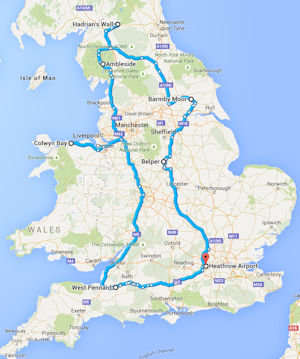 Chatsworth is not going to happen. Margene woke up sick as a dog, barely able to get out of bed if she was so inclined ...
and she definitely was not so inclined. So we had to tell Cousin Judith and husband they were on her own this time.
Disappointing on several levels, but also smart on several levels as well. Rest is the best medicine for Margene right now
and Judith is going in for a knee replacement in a week (everybody's doing it!) so couldn't chance picking up something from
Margene.
Chatsworth is not going to happen. Margene woke up sick as a dog, barely able to get out of bed if she was so inclined ...
and she definitely was not so inclined. So we had to tell Cousin Judith and husband they were on her own this time.
Disappointing on several levels, but also smart on several levels as well. Rest is the best medicine for Margene right now
and Judith is going in for a knee replacement in a week (everybody's doing it!) so couldn't chance picking up something from
Margene.
So with my child bride down for the count, John took me out for a short historical tour of Belper. That isn't as unlikely as
it may sound. Belper is an old mill town. Back in the late 1700s to mid 1800s, 90% of the stockings that were sold
worldwide! were made right here, most of those in the Strutt mill.
A bit of history: Cotton spinning was carried out on the Belper Mills site from c 1776 to the early 1990s when the English
Sewing Company finally closed down their modern spinning operations. Strutt’s first ‘North Mill’, a timber-framed building,
was completed in 1786. Fire was a major hazard for early cotton factories. Cotton fiber filled the air, lighting was by
candle or oil lamp, machinery had to be oiled constantly and some processes involved metal parts beating against each other
and creating sparks. North Mill burned down in 1803, uninsured.
The founder's son, William, designed the replacement mill (photo below) which houses a museum today, along with office suites
(and a lot of still empty space!) He brought in a number of innovations including an iron ‘fire-proof’ frame. This was widely
copied and became a template for modern skyscraper engineering. At its peak, the Strutt mills employed almost 2000 people,
most of them women and children. They'd work cheaper than men would and were small enough to get under the machines when
a thread broke or something needed fixing!
(BTW, they'd often do the fixing while the machine was still running! OSHA would've had a heart attack!)
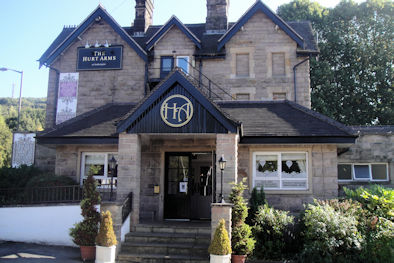
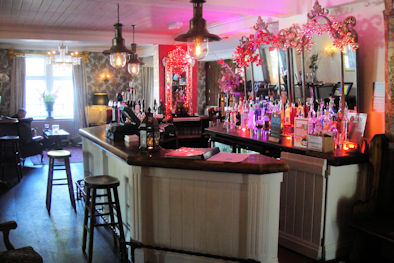
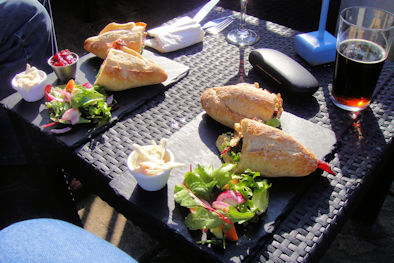
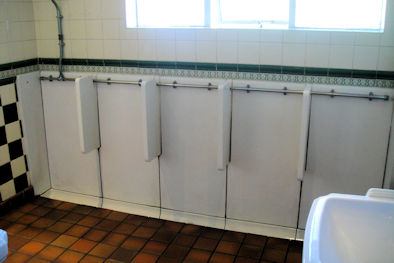
John and I had lunch at the Hurt Arms pub after we discovered his first choice pub was closed for
a wake. The bar at Hurt Arms seemed more like Christmas in a discount brothel than a serious restaurant, but they dispensed
all the right stuff. We had baguette sandwiches on a sunny outdoor patio. I was reminded again how critical the quality of
the bread is to a great sandwich. In this case, the soft interior and crunchy exterior of the bread made the combination of
chicken breast, caramelized red onions and watercress memorable. British pubs seem to be big on trough urinals in their mens
rooms. I don't know exactly why that was worth a picture, but here is is anyway!
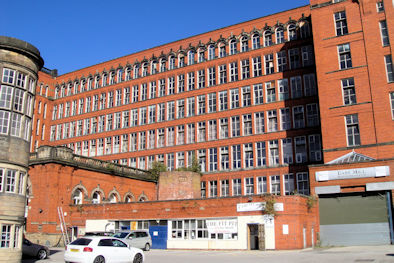
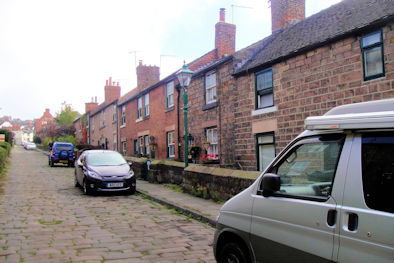

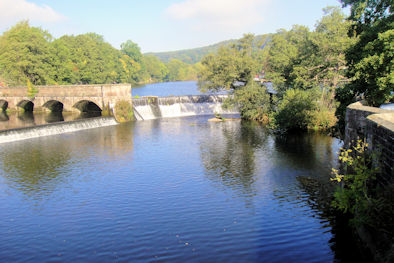
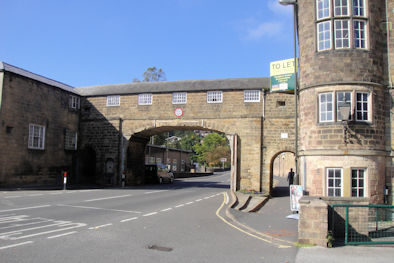
Operating since 1804, Strutt's North Mill is now a key element of the Derwent Valley Mills World
Heritage Site. (John was quick to point out that puts Belper in the same league as the Taj Mahal!) Many of the Strutt
buildings were demolished in the 1950s and 60s so North Mill and the nearby weir give just an idea of the vast mill site and
the impact it had on the town. Near the mill site is The Long Row, tiny cottages for the mill workers, now quite sought-after.
As we walked up the cobbled street, we ran into Bryan, one of the residents and a mapmaker/historian John had met before. He
invited us into his home at No. 7 and went on in great detail about the houses and the area.
The bridge across the road is part of the original mill. The small dark squares you see above the sidewalk arches are
actually rifle ports cut into the original stone for self-defense. In the early days of the Industrial Revolution, mills like
these were under contant threat of attack from the Luddites, 19th-century English textile workers (or self-employed weavers
who feared the end of their trade) who protested against newly developed labor-economizing technologies by destroying
machinery and burning the mills, primarily between 1811 and 1816. The stocking frames, spinning frames and power looms
introduced during the Industrial Revolution threatened to replace them with less-skilled, low-wage laborers, leaving them
without work.
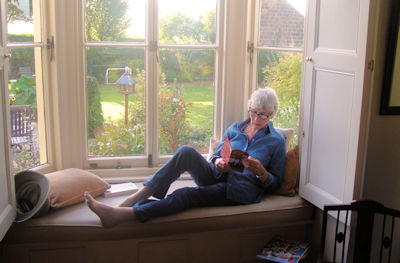
Judy Grear at leisure. What good is a window seat on a sunny afternoon if you can't relax and enjoy
it?
 [Itinerary Page]
[Itinerary Page]
© 2015 Restaurant Doctor
 Chatsworth is not going to happen. Margene woke up sick as a dog, barely able to get out of bed if she was so inclined ...
and she definitely was not so inclined. So we had to tell Cousin Judith and husband they were on her own this time.
Disappointing on several levels, but also smart on several levels as well. Rest is the best medicine for Margene right now
and Judith is going in for a knee replacement in a week (everybody's doing it!) so couldn't chance picking up something from
Margene.
Chatsworth is not going to happen. Margene woke up sick as a dog, barely able to get out of bed if she was so inclined ...
and she definitely was not so inclined. So we had to tell Cousin Judith and husband they were on her own this time.
Disappointing on several levels, but also smart on several levels as well. Rest is the best medicine for Margene right now
and Judith is going in for a knee replacement in a week (everybody's doing it!) so couldn't chance picking up something from
Margene.








